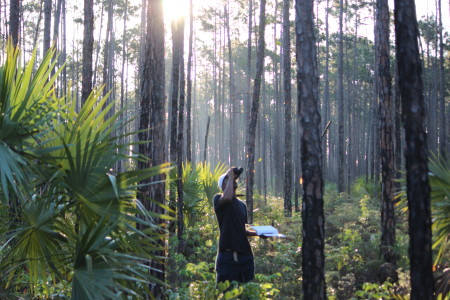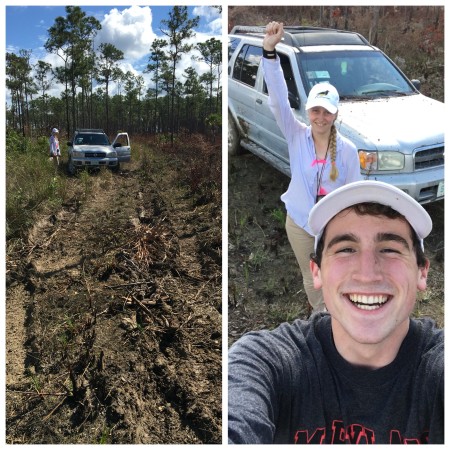
Dan Stonko joined Dr. Kevin Omland’s research group studying the Bahama Oriole as an undergraduate at the University of Maryland, Baltimore County. With the research team, he traveled to Andros in the Bahamas to search for the nesting Bahama Oriole and gained invaluable field experience while making memories of a lifetime (check out his recent blog article). Here, Dan summarizes his perspective of science, education and mentoring as learned through his undergraduate experiences.
As an undergraduate, I have been incredibly lucky with the opportunities I’ve received. Taking on undergraduate students into your lab can be risky in itself for multiple reasons – we are usually inexperienced, require time and effort to train, and usually can’t contribute nearly as much as a higher-level student/employee. For these very reasons, I have come to be evermore grateful for getting the kinds of opportunities as amazing and impactful as I’ve shared in my previous blog post. Whenever anyone asks me about our lab’s work, I start off by discussing the science and research. Before long, I tend to catch myself getting into the unexpected and memorable lessons I’ve learned. So here are just a few of those lessons:
1. The most impactful learning can happen outside of the classroom
Okay, this might sound cliché. But when I started college, I felt certain that most of my time in college would be spent either in class or studying. I then reasoned that most of my learning would therefore happen in class or while studying.
I graduate in two months and can definitely confirm that this is how I spend most of my time. Yes, as a biochemistry major I have gained much of the central scientific knowledge through classes. However, the science I study has come to life through my research. I’ve applied my knowledge to real-world situations, designed experimental procedures, built relationships with mentors, collaborated with peers, and worked in the field. These lessons and experiences will be with me forever, and they’re the kinds of things you can’t get by simply sitting in class or reading a textbook.

2. Science is a verb
Whether doing field research in a pine forest, looking through a microscope or telescope, or mixing chemicals in a beaker – I have come to see science, in its purest form, as the pursuit of knowledge. Not a noun, but a verb. It is the act of careful observation, meticulous investigation, and ceaseless questioning of the things around us. If the pieces fit together just right, our curiosity can be rewarded with an expanded understanding of our world.
3. Modern discoveries in science are made possible by our predecessors
Isaac Newton once wrote that, “If I have seen further it is by standing on the shoulders of giants.” Before I got involved with research, that adage sometimes crossed my mind; often it would do so while reading or hearing about some unimaginably complex discovery that undoubtedly depended on contributions from many people. This thought always gave me a fundamental admiration for the explorers and scientists who came before us. As a researcher, I’ve gained a new and deeper understanding of Newton’s words.
Going into our first trip, most of what was known about the Bahama Oriole came from earlier research by Dr. Melissa Price. Her work provided the most recent population estimates and gave thorough information on the reproductive ecology of the species. Whether I was in the field collecting data or in lab drafting the manuscript to share our findings – I knew that her work (and that of countless others) influenced our work. It’s a humbling reminder for a scientist to keep in mind: with every day that we work and every discovery that we make, our progress is possible because we stand on the shoulders of the giants who mentor us and came before us to provide our foundation.
4. Observation is the true driver of science
Some areas of popularized science today seem to reinforce (what I believe to be) a subtle yet significant misconception, which presumes that questions are at the bedrock of any scientific endeavor. However, I have found observations are the truest foundation. Countless scientific advances throughout history didn’t arise by seeking answers to specific questions. Even when questions have led to advances, initial observations were always there to lead to those questions in the first place. In other words, we first make observations about our world, which then allow us ask questions such as: What? Why? When? How? It all may seem like semantics, but I believe that grasping this subtle distinction instills a sense of deserved respect for observation as the most critical scientific tool for discovery.
Some of our research on this first trip was oriented towards specific questions or goals, such as the distance sampling surveys that we used to estimate population size. The majority of our efforts, however, occurred without particular goals and depended simply on observation (e.g. catching and banding orioles, recording observations on bird behavior, and finding nests). At first, this idea of working without a particular goal in mind may seem counterintuitive. Nevertheless, the work proved invaluable as it led to us finding orioles nesting in the pine forests. This trip serves as reminder that simply listening, watching, and being present to make observations can lead to unexpected discovery.
